Prior to your baby reaching toddlerhood, you spoke to them and the most you received back were adorable coos and babbles. When they become toddlers, you’re in for a big surprise at how fast their language develops. Around the 2nd or 3rd year of life, children begin to learn language very quickly and will soon talk your ears off. Most two year olds can already say 20 to 200 words. After the age of three, toddlers can say close to 1,000 words.
While they cannot learn to speak like this by themselves, then how to help toddler talk? Parents who talk to their babies and toddlers give them these skills. The more you talk to your baby, the more developed his or her language skills will be when they start preschool.
How to Help Toddler Talk
Making learning words fun for toddlers will help keep them interested in talking. There are many different things you can do to make learning to talk fun for your toddler.
1. Use Gestures to Help Toddler
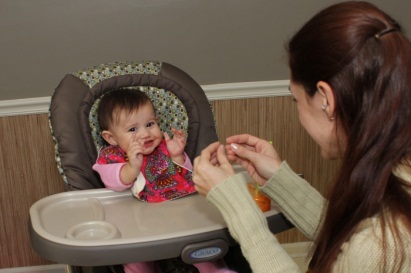 Using gestures can help your toddler learn to communicate with you early on. Simple gestures can go with one word commands to help them understand what you are saying. You can create a gesture for “eat” by putting your hand to your lips or use a gesture pointing upwards for the word “up”. Studies show that when gestures are used, toddlers pick up language skills quicker. Speaking is actually a motor skill and when you match words with gestures, your baby’s brain will learn to make connections between things, actions and words.
Using gestures can help your toddler learn to communicate with you early on. Simple gestures can go with one word commands to help them understand what you are saying. You can create a gesture for “eat” by putting your hand to your lips or use a gesture pointing upwards for the word “up”. Studies show that when gestures are used, toddlers pick up language skills quicker. Speaking is actually a motor skill and when you match words with gestures, your baby’s brain will learn to make connections between things, actions and words.
2. Read and Discuss
 Talk about what you are reading and give your toddler time to give his own input on a book. You can stop and ask questions like what a certain color or item is, what is under the flap of a “lift the flap” book or what they are feeling in a touch of the book and give your toddler time to answer them.
Talk about what you are reading and give your toddler time to give his own input on a book. You can stop and ask questions like what a certain color or item is, what is under the flap of a “lift the flap” book or what they are feeling in a touch of the book and give your toddler time to answer them.
3. Encourage Blank Filling with Pause During Story Time
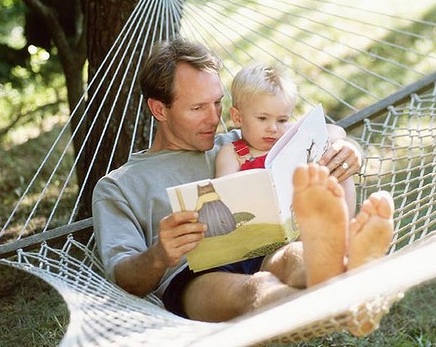 You have that one book you've read over and over again with your toddler. Next time you read it, place some pauses in after reading a few lines. You might be pleasantly surprised that your toddler recites the next few words or even lines. You can even prompt him or her by asking, “What comes next?” You can try this with a good series of children books like the Dr. Seuss.
You have that one book you've read over and over again with your toddler. Next time you read it, place some pauses in after reading a few lines. You might be pleasantly surprised that your toddler recites the next few words or even lines. You can even prompt him or her by asking, “What comes next?” You can try this with a good series of children books like the Dr. Seuss.
4. Constantly Talk With Your Toddler
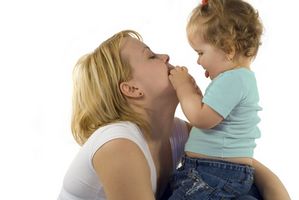 Talking to your toddler throughout the day will reinforce the daily use of language and communication. Over the course of the day, when your toddler verbally identifies an item or action, reinforce it by saying “you’re right! That is milk, cold, fork, etc." Also, make eye contact when chatting with your child and call his or her name.
Talking to your toddler throughout the day will reinforce the daily use of language and communication. Over the course of the day, when your toddler verbally identifies an item or action, reinforce it by saying “you’re right! That is milk, cold, fork, etc." Also, make eye contact when chatting with your child and call his or her name.
5. Play With Your Toddler
 If you have a toddler, playtime is mandatory! That means you need to get down on their level and play with them. Even if you talked to your toddler all day about what you are doing and what he or she is doing, they won’t completely understand until you enter their world and show them on their terms – through play. Some popular games to play with a toddler are “peek-a-boo”, and the interactive “patty cake” game. Not only does this give you plenty of social interaction, it also helps build motor skills and language.
If you have a toddler, playtime is mandatory! That means you need to get down on their level and play with them. Even if you talked to your toddler all day about what you are doing and what he or she is doing, they won’t completely understand until you enter their world and show them on their terms – through play. Some popular games to play with a toddler are “peek-a-boo”, and the interactive “patty cake” game. Not only does this give you plenty of social interaction, it also helps build motor skills and language.
6. Involve Your Toddler in Phone Chatting or Video Recording
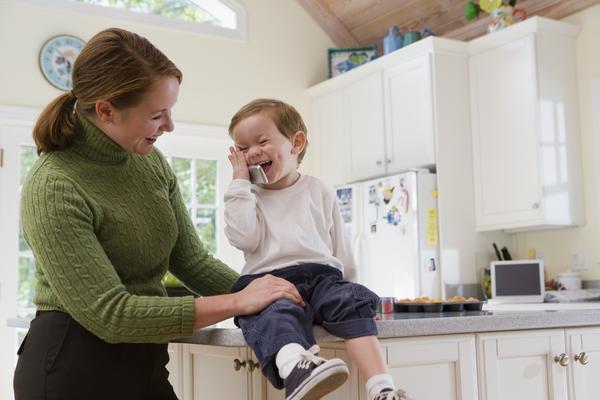 Toddlers love phones. You may even notice yours playing on a toy phone while you are talking. You can use that fascination to encourage your toddler to talk. When you get a phone call from a friend or family member, hand the phone to your toddler to talk to them. Cue your child by telling them to let the caller know what they are doing, what they had for lunch or something fun they did.
Toddlers love phones. You may even notice yours playing on a toy phone while you are talking. You can use that fascination to encourage your toddler to talk. When you get a phone call from a friend or family member, hand the phone to your toddler to talk to them. Cue your child by telling them to let the caller know what they are doing, what they had for lunch or something fun they did.
Toddlers also love to sing, dance and perform. Try making a video recording of your child. Start the camera, point it at your child and yell, “action!” Your child may begin his or her show right away or you may need to direct them a little bit. Try having them sing their favorite song or you could “interview” them by asking questions. After filming, you can show the video to your child so they can see their performance, which will encourage them to do this more.
7. Engage Toddler in Word Games
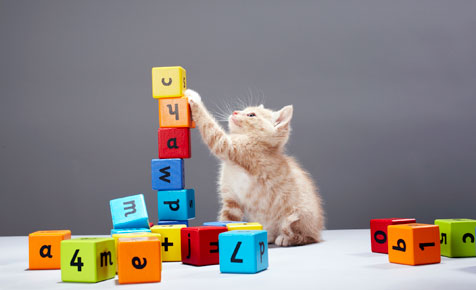 Learning to talk is much more fun if toddlers look at it as a game. Play a game by asking your toddler what something is and have them try to come up with the right answer. Whenever you are in a location, the kitchen, the bathroom, the grocery store or driving down the street, ask your child, “What is this?” Give them time to tell you the answer. You can avoid them getting frustrated by starting the game with something he or she is familiar with, for instance a glass of milk, a food item, a favorite pet. If they do end up getting frustrated, you can help a little by saying the answer slowly or softly. Usually when you do this, their eyes will light up and they will say the word on their own.
Learning to talk is much more fun if toddlers look at it as a game. Play a game by asking your toddler what something is and have them try to come up with the right answer. Whenever you are in a location, the kitchen, the bathroom, the grocery store or driving down the street, ask your child, “What is this?” Give them time to tell you the answer. You can avoid them getting frustrated by starting the game with something he or she is familiar with, for instance a glass of milk, a food item, a favorite pet. If they do end up getting frustrated, you can help a little by saying the answer slowly or softly. Usually when you do this, their eyes will light up and they will say the word on their own.
8. Narrate Your Day
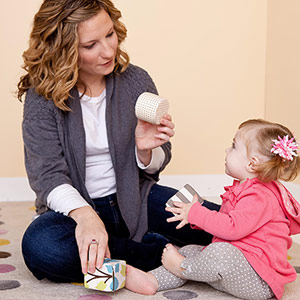 Toddlers learn by listening to you talk. Whatever you do during the day, talk about it to your child. When you wash your car, talk about putting the soap on, scrubbing and rinsing. When you go grocery shopping, talk about things like picking out tomatoes, oranges, bread and milk. While you’re cooking dinner, name some of the items you are cooking. As you put your toddler to bed, talk about what you did together that day. Ask questions about where your toddler went, what he liked best, and friends that he spent time with. Frame your questions, so your child has to say more than one or two words.
Toddlers learn by listening to you talk. Whatever you do during the day, talk about it to your child. When you wash your car, talk about putting the soap on, scrubbing and rinsing. When you go grocery shopping, talk about things like picking out tomatoes, oranges, bread and milk. While you’re cooking dinner, name some of the items you are cooking. As you put your toddler to bed, talk about what you did together that day. Ask questions about where your toddler went, what he liked best, and friends that he spent time with. Frame your questions, so your child has to say more than one or two words.
9. Find Your Toddler More Playdates
 When children play together, they will try to communicate with each other. There may be toddlers that say a few more words and when your child hears them talk, he may start talking more too. If your child’s language skills fall a little behind other kids, he will see and hear them talking and learn to communicate better. Play dates help your child learn conversation skills with other kids. They learn how to function in school and how to make friends.
When children play together, they will try to communicate with each other. There may be toddlers that say a few more words and when your child hears them talk, he may start talking more too. If your child’s language skills fall a little behind other kids, he will see and hear them talking and learn to communicate better. Play dates help your child learn conversation skills with other kids. They learn how to function in school and how to make friends.
A mom shares how to help toddler talk in the video below:






